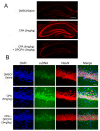Adenosine A1 and A2A Receptors in the Brain: Current Research and Their Role in Neurodegeneration
- PMID: 28441750
- PMCID: PMC6154612
- DOI: 10.3390/molecules22040676
Adenosine A1 and A2A Receptors in the Brain: Current Research and Their Role in Neurodegeneration
Abstract
The inhibitory adenosine A1 receptor (A1R) and excitatory A2A receptor (A2AR) are predominantly expressed in the brain. Whereas the A2AR has been implicated in normal aging and enhancing neurotoxicity in multiple neurodegenerative diseases, the inhibitory A1R has traditionally been ascribed to have a neuroprotective function in various brain insults. This review provides a summary of the emerging role of prolonged A1R signaling and its potential cross-talk with A2AR in the cellular basis for increased neurotoxicity in neurodegenerative disorders. This A1R signaling enhances A2AR-mediated neurodegeneration, and provides a platform for future development of neuroprotective agents in stroke, Parkinson's disease and epilepsy.
Keywords: A1R-mediated neurotoxicity; adenosine receptor cross-talk; neurodegenerative diseases.
Conflict of interest statement
The authors declare no conflict of interest.
Figures


References
-
- Fredholm B.B., Chen J.-F., Cunha R.A., Svenningsson P., Vaugeois J.-M. Adenosine and brain function. Int. Rev. Neurobiol. 2005;63:191–270. - PubMed
Publication types
MeSH terms
Substances
LinkOut - more resources
Full Text Sources
Other Literature Sources
Medical

